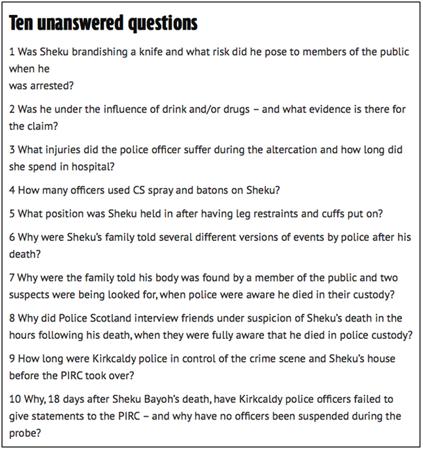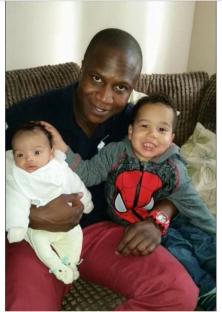by Siana Bangura Follow @Sianaarrgh
Have you heard of Sheku Bayoh?
Sheku Ahmed Tejan Bayoh, a Sierra Leonean man who worked for British Gas and had two young children, died on 3rd May 2015, after being arrested by police in Kirkcaldy, Fife. He had been detained, handcuffed, pepper-sprayed, and put in leg restraints following an alleged altercation with a police officer. It is alleged that Mr Bayoh was wielding a knife, although this has not been proven.
Since the incident Mr Bayoh’s family have been given several conflicting accounts as to how and why he died – nearly a month on they still don’t know what happened.
If your answer to the first question was “no”, you would not be alone. Outside of Scottish news, the media coverage of this case has been thin, to say the least.
Shockingly, none of the 11 officers involved have been suspended whilst investigations around the circumstances of Mr Bayoh’s death continue. Additionally it has been reported that the Police Investigations and Review Commissioner (PIRC) was only called in to investigate two days after Mr Bayoh died, meaning critical time was wasted. According to his sister, Kadijartu Johnson, the family were not made aware of his death until six hours after he was declared dead in a nearby hospital.
This is when the lies began. At first the family were told that Mr Bayoh was found lying on the street and that the police were looking for two apparent assailants.
Ms Johnson said:
“Several versions of events were given to my family for several hours after his death until finally we were told he had died in police custody in the early evening.”
Now the Bayoh family are demanding answers to find out what truly happened to Mr Bayoh on May 3rd. They recently released the following ten questions to the police:

Mr Bayoh’s story is part of a pattern in the UK when it comes to Black people and the police state.
Research conducted by INQUEST (a British charity providing specialist advice services to the bereaved and the wider public on contentious deaths and their investigation) found that between 2005 and 2015, a disproportionate number of those who die in, or following, police custody in England and Wales as a consequence of force have been from Black and Minority Ethnic (BAME) communities.
Over the past 24 years, more than 500 BAME individuals have died in suspicious circumstances whilst in state detention. Yet not a single official has been successfully prosecuted, according to a report by the Institute of Race Relations. A large proportion of these deaths involved undue and excessive force, and many more were due to a “culpable lack of care”. Often individuals detained suffered from a (severe) mental illness. The majority of the 509 BAME deaths studied since 1991 occurred in prison, with 137 cases in police custody and 24 deaths recorded in immigration detention.
Some of the most high profile Black victims of police brutality, police neglect, and gross misconduct by the police include: David Oluwale (1969), the first known Black person to have died in police custody in the UK; Cherry Groce (1985); Joy Gardner (1993); Stephen Lawrence (1993); Christopher Alder (1998); Roger Sylvester (1999); Azelle Rodney (2005); Frank Ogboru (2006); Sean Rigg (2008); Jimmy Mubenga (2010); David “Smiley Culture” Emmanuel (2011); Mark Duggan (2011); Kingsley Burrell (2011); Anthony Grainger (2012); Julian Cole (2013), who has been left in a vegetative state; and now Sheku Bayoh (2015). In the case of Stephen Lawrence, it took over twenty years of campaigning to bring his killers to justice after the police played a key role in obstructing the course of justice, but still, for the victims and their families, there remains no justice and no peace.
In the UK, a Black person is less likely to be shot dead on the streets (although Mark Duggan was) than in America, but they are still likely to be detained with brute force and left to die at the hands of neglectful officers. The racism in Britain’s justice system is slow, gradual, insidious but deadly nonetheless. We are complacent because we do not think things like this happen here, but they do and they have done for years. Officers have been left to literally get away with murder.
Although the Black Lives Matter movement has gained momentum worldwide and has become this generation’s very own Civil Rights struggle, it seems the sentiment has not fully caught on in the case of Black victims in Britain. There is rarely enough media coverage at home or abroad, and there are rarely enough marches, and voices demanding justice in solidarity with the families of Black British and diasporic victims. High profile cases such as the campaign for justice led by Baroness Doreen Lawrence, as well as the campaign for justice after the death of Mark Duggan, particularly during and in the aftermath of the 2011 London riots, have garnered attention — but this is not enough.
Since “Pleb-gate”, more of the general public have seen that the police do lie, cover-up, and make up stories, and there are officers who do believe that they are above the very law they enforce. Even so, the Lawrence and Duggan cases were framed as extraordinary, rather than as part of a state culture of institutional racism. The consequence of such a lack of dialogue over police patterns of brutality has led to a false sense of security. I have heard white and Black people say, “these things rarely happen in the UK”, or that they do not happen at all.
In the case of Sheku Bayoh, the police have not only lied, refused to cooperate with the family and the PIRC, and shown a worrying – but not atypical– lack of remorse and sensitivity in the statements they have released to the press; they have also failed to keep the public safe by not suspending the officers involved with Mr Bayoh’s case while investigations take place.
Now they are targeting the grassroots resistance movement that Mr Bayoh’s family and friends have begun, starting with the Facebook page set up in his memory. A warning letter was sent from PBW Law, the legal body representing the officers involved, stating that the memorial Facebook page has broken the law.
The Bayoh family’s lawyer, Aamer Anwar, said to the press:
“It is very sad that a family in the midst of their grief have been forced to campaign simply to get answers on what happened to Sheku. No family should have to endure what they are going through and certainly nobody with any decency and compassion would attempt to silence them. Surely now is the time for the police officers involved to speak up and tell the truth.”
 This Sunday (31st May) will mark 21 days since Mr Bayoh’s death. 28 days with no answers. The longer the police refuse to speak, the harder it becomes for the Bayoh family, the Black community, and the wider public to keep an open mind about the circumstances of his death.
This Sunday (31st May) will mark 21 days since Mr Bayoh’s death. 28 days with no answers. The longer the police refuse to speak, the harder it becomes for the Bayoh family, the Black community, and the wider public to keep an open mind about the circumstances of his death.
Organisations such as the United Families and Friends Campaign Against Deaths in Custody (UFFC) work tirelessly to support the families of victims of police brutality and organise an annual march of solidarity. London Campaign Against Police and State Violence, Movement for Justice, Newham Monitoring Project, Northern Police Monitoring Project, London Black Revs, and countless others are making noise at grassroots level and working from the bottom up to hold police accountable, to put a spotlight on the police brutality occurring on British soil, and to demand an end to state violence and injustice.
We, the Black community in the UK, and our Black brothers and sisters abroad need to support campaigners like Marcia Rigg, who has worked tirelessly seeking justice for her brother Sean Rigg since his death; we must attend (more) marches; we must sign petitions, lobby, make noise and demand an end to the killings of our brothers and sisters. We as a global community must unite and demand the destruction of oppressive racist systems and a radical reform of our law enforcement institutions. We must hold the police accountable, because they are not above the law.
All Black lives matter. We must repeat this and believe it until we are heard.
In the ongoing case of Sheku Bayoh, his family have started a petition to push Scottish police to provide answers and explanations around the circumstances of his death. You can sign it here.
For more information on some of the victims and organisations mentioned, follow these links:
- 10 unanswered questions about the death of Sheku Bayoh
- Sheku Bayoh
- London Campaign Against Police and State Violence
- Black Lives Matter Die-In at Westfields
- Putting Feet on the Ground
- Silencing the Bereaved
- On Deaths in British Custody: No officer convicted since 1969
- On the Death of Mark Duggan
- Dying for Justice
- Over 500 Black and Asian Deaths in Custody
- Kingsley Burrell
All work published on Media Diversified is the intellectual property of its writers. Please do not reproduce, republish or repost any content from this site without express written permission from Media Diversified. For further information, please see our reposting guidelines.
Hailing from London – via Freetown – Siana Bangura is a History graduate of the University of Cambridge, a writer, blogger, journalist, and Black British Feminist. She is the founder and editor of No Fly on the WALL, a platform to discuss, celebrate, and engage with Intersectional Feminism, with a special focus on the voices of Black British women’s experiences. Follow her on Twitter @sianaarrgh
For more, visit: www.noflyonthewall.com and online at: www.dontgotheresiana.com
This article was edited by Henna Butt
Did you enjoy reading this article? Help us continue to provide more! Media Diversified is 100% reader-funded –you can subscribe for as little as £5 per month here

We all need to do everything we can to promote Justice in our society – change always comes from grassroots level. Get active!
LikeLike
Another appalling case in a long line of them.
Talking about it, especially to them isn’t going to put a stop to it. Talking never accomplishes anything.
Death and prsion is the only thing that makes them stop. I do not own a prison.
LikeLike
Thank you for covering this.
This death is highly suspicious, and still the police officers involved have not been interviewed.
Police Scotland are becoming increasingly worrying. In the last year they have started running about with guns. After a public outcry, they announced that they would no longer do so, but still reports of armed police attending routine policing matters, including traffic stops are coming forward.
The Scottish Government urgently needs to get a grip on Police Scotland, not least for the sake of Sheku Bayou and his family before more tragedies happen.
LikeLike
Poor man, I hope his family get answers and justice.
LikeLike